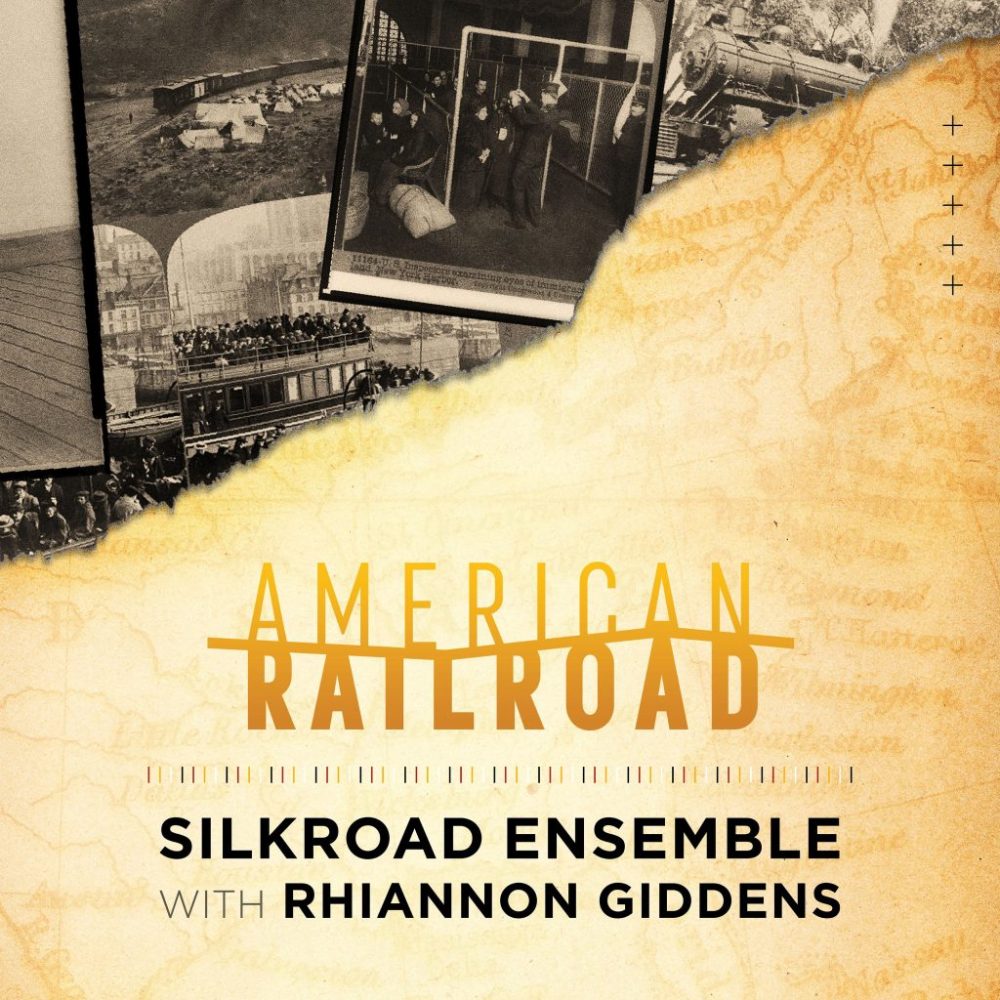Silkroad Ensemble with Rhiannon Giddens – American Railroad (Nonesuch)
American Railroad is a compelling album by the Silkroad Ensemble, under the artistic direction of Rhiannon Giddens. Produced by Giddens alongside Jody Elff , who also engineers the album, and Kaoru Watanabe, who also contributes flute and percussion.
This ambitious project delves into the rich tapestry of American history. It uses music to highlight the diverse cultural influences that shaped the nation’s railroads, and the building of the railroads as a powerful metaphor for the nation as a whole. Featuring an exceptionally talented group of musicians, each contributing their unique artistry, the album explores heritage and identity through a lens of collaboration and inclusivity.
Rhiannon Giddens is an acclaimed musician celebrated for her contributions to folk, blues, and old-time music, wielding her voice, fiddle, and banjo to profound effect. Her work has often explored the African American roots of American music, and in American Railroad, her focus widens to shine a light on the contributions of other marginalised communities, including the Chinese, Irish, and Indigenous peoples who built the transcontinental railway. This project aligns seamlessly with the Ensemble’s mission, established by cellist Yo-Yo Ma, to connect the world through music by blending diverse cultural traditions.
The album opens with Pura Fé’s haunting conch shell on Invocation, setting a meditative tone that immerses the listener in themes of spirituality, reverence, and resilience. This is followed by Giddens’ arrangement of Swannanoa Tunnel/Steel Driving Man, where rhythmic patterns evoke the relentless toil of labourers, connecting the listener to their hardships and the changing rhythms of trains—a motif that recurs and resonates throughout the album.
The musicianship of the Silkroad Ensemble is integral to the album’s power, with individual instruments taking centre stage in various tracks. Rainy Day showcases the virtuosity of Wu Man on the pipa, a lute-like instrument, weaving harmonies with Giddens’ banjo to captivate the listener. In Far Down Far, Maeve Gilchrist’s composition transitions from a delicate string lament to a louder, percussive section, encompassing both sadness and hope. The eight-minute-long Tamping Song, led by Haruka Fujii, builds from intricate rhythms on Japanese taiko drums into a dynamic, pulsating soundscape.
Rela, performed by tabla master Sandeep Das, invites listeners to draw parallels between the construction of the American Transcontinental Railroad and the British-instituted Indian railway system. The track’s rapid, rolling sequences of multiple instruments mimic the sound of a moving train, blending rhythmic precision with a sense of motion and urgency.
The experiences of Indigenous peoples are particularly honoured in Wíȟaŋblapi Mázačhaŋku, composed by Susan Kite. This instrumental piece is inspired by the Lakota visual language interpretation of dreams. Additionally, Mahk Jchi, sung in the extinct Tutelo and Saponi dialects of the Sioux nation, celebrates the cultural heritage and resilience of Native American communities.
Fulani Sanjurokkei references the Fulani people of Sub-Saharan Africa, incorporating their traditional melodies and chants alongside modern instrumentation. This track highlights the musical and cultural links between Africa and America. In contrast, Have You Seen My Man offers a soulful, gospel-tinged piece composed by Cécile McLorin Salvant, with Pura Fé and Mazz Swift lending rich vocals to convey a poignant tale.
The swirling cello and violins in Swannanoa Strings evoke a much needed sense of calm, while Congolese guitarist Niwel Tsumbu reworks and expands his title track Milimo from his recent solo album. The Ensemble’s instrumentation enriches the original, stretching it from a raw two minutes to a lush, layered six-minute piece, with Yahzi Guo’s shawn providing a striking presence.
The album concludes with Oh Shout, a powerful multi instrument collaboration featuring the harmonised vocals of Giddens, Pura Fé, and Mazz Swift. As the voices, and music, rises and falls, the listener is left with a sense of defiance, solidarity, and hope.
American Railroad is an intricate exploration of the multifaceted experiences tied to the construction of the railroads, while drawing parallels to the histories of other cultures. The Ensemble’s expertise and imaginative use of a wide variety of instruments—many unfamiliar to this writer—create a compelling listening experience. Alongside the musicians already mentioned, the Ensemble includes Shawn Conley (bass), Karen Ouzounian (cello), Michi Wiancko (violin), and Francesco Turrisi (accordion), Giddens’ musical and life partner.
The album is part of a broader exploration of these themes, complemented by live performances, community educational engagements, and a podcast series that enriches its historical and cultural narrative. It is an educational and emotional journey—one that engages the mind, emotions, and the ears—and is well worth the time spent exploring.
John Bradbury
